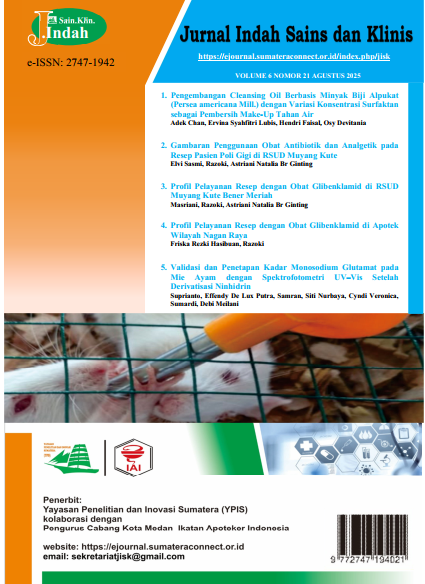Profil Pelayanan Resep dengan Obat Glibenklamid di Apotek Wilayah Nagan Raya
DOI:
https://doi.org/10.52622/jisk.v6i2.04Keywords:
glibenclamide, prescription service, counseling, labeling, simulated patient, pharmacyAbstract
Background: Community pharmacies have shifted from focusing only on products to providing care centered on patients. Pharmacists now have the role of gathering patient information, giving proper counseling, and ensuring medicine labels are clear and correct. This is crucial for chronic diseases like type 2 diabetes mellitus, where drugs such as glibenclamide must be used properly to avoid risks. Objective: This study aimed to describe how pharmacies in Nagan Raya provide prescription services for glibenclamide, especially in terms of patient data collection, counseling, and labeling. Methods: A descriptive study was done using the simulated patient method. A total of 90 pharmacies were randomly chosen. The researcher acted as a patient’s family member and presented a prescription for glibenclamide. Observations were recorded right after each visit using a structured and validated checklist. Results: Of the 90 pharmacies visited, 85 (94.4%) dispensed the medicine. However, only 18.8% asked for the patient's address, and fewer than 10% asked about other key information like user identity or medication history. No pharmacy asked about symptoms, allergies, or comorbidities. For counseling, 64.7% mentioned how often to take the drug, 15.3% explained timing, and just 1.2% discussed side effects. Labels were provided in 65.9% of cases, but some were incomplete or used wrongly. Conclusion: The quality of prescription services for glibenclamide in Nagan Raya is still lacking. Important steps like patient assessment and counseling are often missed. Better training and stronger supervision are needed to improve pharmacy services and ensure patient safety
Downloads
References
Visacri MB, Figueiredo IV, de Mendonça Lima T. Role of Pharmacist During the COVID-19 Pandemic: A Scoping Review. Res Soc Adm Pharm. 2021;17(1):1799–806. DOI: https://doi.org/10.1016/j.sapharm.2020.07.003
Fajarini H. Implementasi Peraturan Menteri Kesehatan RI No. 73 tahun 2016 Tentang Standar Pelayanan Kefarmasian di Apotek. Parapemikir J Ilm Farm. 2018;7(2):260–9. DOI: https://doi.org/10.30591/pjif.v7i2.939
Wibowo Y, Parsons R, Sunderland B, Hughes J. Evaluation of Community Pharmacy-Based Services for Type-2 Diabetes in an Indonesian Setting: Pharmacist Survey. Int J Clin Pharm. 2015;37(5):873–82. DOI: https://doi.org/10.1007/s11096-015-0135-y
Magliano DJ, Boyko EJ. IDF Diabetes Atlas. Brussels: International Diabetes Federation; 2022.
Guo L, Ma J, Tang J, Hu D, Zhang W, Zhao X. Comparative Efficacy and Safety of Metformin, Glyburide, and Insulin in Treating Gestational Diabetes Mellitus: A Meta‐Analysis. J Diabetes Res. 2019;2019(1):9804708. DOI: https://doi.org/10.1155/2019/9804708
Fajriansyah, Iskandarsyah A, Puspitasari IM, Lestari K. Impact of Pharmacist Counseling on Health-Related Quality of Life of Patients with Type 2 Diabetes Mellitus: a Cluster Randomized Controlled Study. J Diabetes Metab Disord. 2020;19(2):675–82. DOI: https://doi.org/10.1007/s40200-020-00528-x
Boura F, Al-Tabakha M, Hassan N, Darwich M. Critical Appraisal of Simulated Patient Methodology to Assess the Practice of Community Pharmacist in the Middle East and North Africa Region: A Systematic Review. Pharm Pract (Granada). 2022;20(3):2701. DOI: https://doi.org/10.18549/PharmPract.2022.3.2701
Björnsdottir I, Granas AG, Bradley A, Norris P. A Systematic Review of the Use of Simulated Patient Methodology in Pharmacy Practice Research from 2006 to 2016. Int J Pharm Pract. 2020;28(1):13–25. DOI: https://doi.org/10.1111/ijpp.12570
Hamon J. Health Service Responsiveness: A Case Study of Integrated Family Planning and Childhood Immunisation Services in Malawi. London School of Hygiene & Tropical Medicine; 2023.
Kementerian Kesehatan Republik Indonesia. Kepmenkes No.HK.01.07/Menkes/6485/2021 tentang Formularium Nasional. Jakarta: Kementerian Kesehatan Republik Indonesia; 2021.
Niriayo YL, Kumela K, Kassa TD, Angamo MT. Drug therapy problems and contributing factors in the management of heart failure patients in Jimma University Specialized Hospital, Southwest Ethiopia. PLoS One. 2018;13(10):e0206120. DOI: https://doi.org/10.1371/journal.pone.0206120
Youssef A. Pharmaceutical Care Practice: The Clinician’s Guide. Int J Toxicol. 2004;23(6):379-380. DOI: https://doi.org/10.1080/10915810490902074
Kokane J V, Avhad PS. Role of Pharmacist in Health Care System. J community Heal Manag. 2016;3(1):37–40.
Care D. Diabetes: Standards of Medical Care in Diabetes2022. Diabetes Care. 2022;45(1):S113–24. DOI: https://doi.org/10.2337/dc22-S008
World Health Organization. WHO Guideline on Self-Care Interventions for Health and Well-being, 2022 Revision. New York: World Health Organization; 2022.
Committee ADAPP, Committee: ADAPP. Pharmacologic Approaches to Glycemic Treatment: Standards of Medical Care in Diabetes 2022. Diabetes Care. 2022;45(Supplement_1):S125–43. DOI: https://doi.org/10.2337/dc22-S009
Pharmacists AS of HS. ASHP Guidelines on Pharmacist-Conducted Patient Education and Counseling. Am J Heal Syst Pharm. 1997;54(4):431–4. DOI: https://doi.org/10.1093/ajhp/54.4.431
World Health Organization. Good Pharmacy Practice: Joint FIP/WHO Guidelines on Good Pharmacy Practice 2011. Netherlands: World Health Organization 2021.
Goedecke T, Ord K, Newbould V, Brosch S, Arlett P. Medication Errors: New EU Good Practice Guide on Risk Minimisation and Error Prevention. Drug Saf. 2016;39(6):491–500. DOI: https://doi.org/10.1007/s40264-016-0410-4
Downloads
Published
Issue
Section
License
Copyright (c) 2025 Jurnal Indah Sains dan Klinis

This work is licensed under a Creative Commons Attribution-NonCommercial-ShareAlike 4.0 International License.
Copyright © The Author(s). This article is licensed under a Creative Commons Attribution-NonCommercial-ShareAlike 4.0 International License (CC BY-NC-SA 4.0).







 This work is licensed under a
This work is licensed under a 
